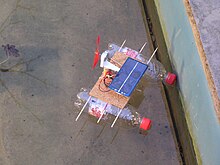Hessen SolarCup
The Hessen SolarCup is a competition for model vehicles and boats that are powered by solar power . Children and young people should experience the application of technology with solar energy. The focus is on energy efficiency and sustainability . Self-built, solar-powered boats and model vehicles compete against each other. The winner will be whoever uses the sun's energy most efficiently. The focus is on working in a team. The aim is to arouse and promote interest in technically oriented training.
Participant classes
Solar boats
Students work as a team to build a solar-powered boat that is equipped with identical drive components. The hull is manufactured according to our own designs. In the up to three races (depending on the weather) up to four boats drive simultaneously on a water surface of 4 × 10 meters from edge to edge (4 meters) and back again for a set time. Documentation with images from the construction phase is evaluated according to a fixed point system, as is the design and construction. Each team also prepares a poster on a given topic, which is taken into account in the overall evaluation. The winners are the boats of the teams that have collected the most points overall with the driving results and the other evaluations. Training courses on building solar boats and on integrating them into lessons are offered.
Ultralight solar mobile
In teams of at least two to a maximum of ten students, solar-powered ultralight vehicles are developed and built. Two posters will be created for this. The first poster describes and documents the considerations for building the model. The second poster is designed on a special topic. There are two separate assessment classes: firstly, students in grades 5 to 10 and, secondly, students in grades 11 to 13 and trainees. The construction and selection of the components (solar cells, motor, gear, switching mechanism, chassis) are free. The size of the solar cell surface of a maximum of 264 cm² is mandatory.
In the competition on Königsplatz, a track with tracks and guide rails, tunnels and turning stops is set up on which the runs take place. The race results, the construction of the ultralight solar mobile and the posters will be evaluated.
Remote controlled solar mobile
Apprentices and vocational school students design and build remote-controlled solar mobiles as a team. The remote-controlled models are built according to individual ideas. All models have solar panels that provide power. At the Hessen SolarCup on Königsplatz in Kassel, the models race against each other on a course. In this discipline, constantly evolving regulations mean that the participating teams are constantly facing new challenges. The remote-controlled solar mobiles are relatively expensive to develop and build and are located where apprentices (electrotechnical and related professions, mechatronics, industrial mechanics, etc.) are trained in companies. The teachers of the vocational schools cooperate with the training departments of the respective companies. In addition to the number of laps driven, a documentation and presentation, technology and design as well as a technical discussion are included in the evaluation to determine the winners. The focus is on technology and innovation. Each team also designs a poster on a special, current topic in the field of renewable energies and energy efficiency.
SolaRobots
Within an AG or class or project seminar teams are formed. Each team, which consists of 3–5 participants, designs and builds a SolaRobot and creates 2 posters.
In addition to the actual robot team, support from the entire group, class or seminar as a spectator is very welcome. The microcontroller control may have a standard buffer battery of maximum 4.8 V / 80 mAh and the solar cell array (as the vehicle roof) may have a maximum size of 10 cm × 15 cm. The vehicles should be designed and built by the teams according to their own designs and tests. SolaRobots based on kit robots are also accepted. In addition to the poster for documenting the SolaRobot, each participating team will design and produce another poster on a special, changing topic.
venue
The Königsplatz is a circular square in the center of Kassel. It separates the Obere from the Untere Königsstraße and is crossed centrally by the tracks of the tram that runs along these streets. A total of six streets lead to Königsplatz. Today it is part of the pedestrian zone in downtown Kassel.
history
The first Hessen SolarCup competition took place on May 24, 2002 in Kassel on Königsplatz.
The invitation to take part in this event, which takes place once a year, is now addressed to all age groups, in special schools, primary schools, high schools and vocational schools. In the first few years, schoolchildren were able to register for two disciplines: the solar boats and the remote-controlled solar mobiles.
In 2005 an additional discipline, the Ultralight Solar Mobile, was created and in 2008 another discipline, the SolaRobots, was added. On June 17, 2011, the 10th “Hessen SolarCup” took place on Königsplatz as well.
In autumn 2009, a meeting took place in the Federal Ministry of Education and Research (BMBF), to which a delegation from the University of Kassel was invited to discuss the extent to which the Ministry sees opportunities for a nationwide and thus supraregional SolarCup event with the same or to initiate similar objectives as an educational event. The idea was adopted after it had been determined that similar or comparable events had already taken place in other federal states. The winners of the regional events were invited to Berlin for the federal decision. One of the four Hessen SolarCup disciplines with the corresponding regulations, which had been developed by the University of Kassel, was made the content of the federal event. The first event, "Solar Mobile Germany", took place in September 2010 in Berlin at Potsdamer Platz , the second event took place on September 30, 2011 as part of the Clean Tech World trade fair.


